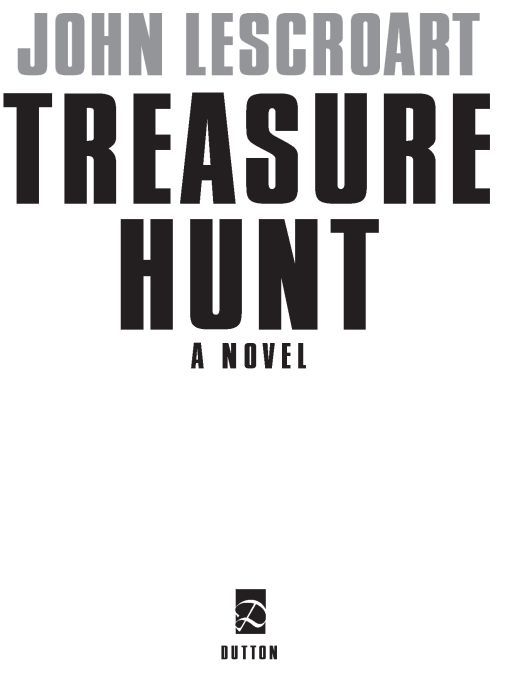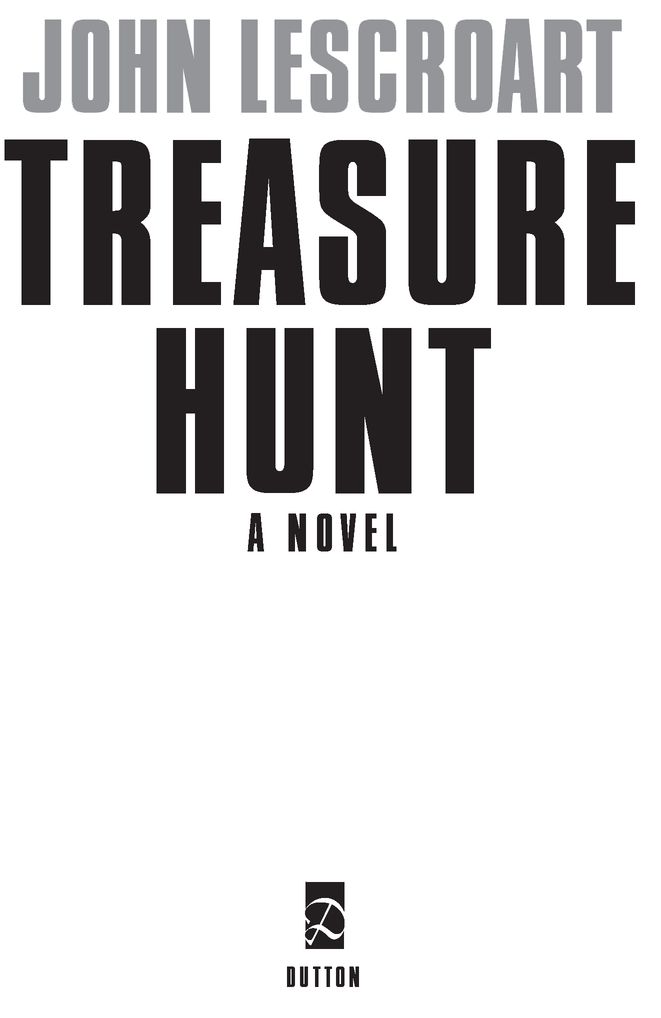Treasure Hunt
Authors: John Lescroart

Table of Contents
Also by John Lescroart
A Plague of Secrets
Betrayal
The Suspect
The Hunt Club
The Motive
The Second Chair
The First Law
The Oath
The Hearing
Nothing but the Truth
The Mercy Rule
Guilt
A Certain Justice
The 13th Juror
Hard Evidence
The Vig
Dead Irish
Rasputin’s Revenge
Son of Holmes
Sunburn
Betrayal
The Suspect
The Hunt Club
The Motive
The Second Chair
The First Law
The Oath
The Hearing
Nothing but the Truth
The Mercy Rule
Guilt
A Certain Justice
The 13th Juror
Hard Evidence
The Vig
Dead Irish
Rasputin’s Revenge
Son of Holmes
Sunburn

Dutton
Published by Penguin Group (USA) Inc.
375 Hudson Street, New York, New York 10014, U.S.A.
Penguin Group (Canada), 90 Eglinton Avenue East, Suite 700, Toronto, Ontario M4P 2Y3, Canada (a division of
Pearson Penguin Canada Inc.); Penguin Books Ltd, 80 Strand, London WC2R 0RL, England; Penguin Ireland, 25 St.
Stephen’s Green, Dublin 2, Ireland (a division of Penguin Books Ltd); Penguin Group (Australia), 250 Camberwell
Road, Camberwell, Victoria 3124, Australia (a division of Pearson Australia Group Pty Ltd); Penguin Books India Pvt
Ltd, 11 Community Centre, Panchsheel Park, New Delhi—110 017, India; Penguin Group (NZ), 67 Apollo Drive,
Rosedale, North Shore 0632, New Zealand (a division of Pearson New Zealand Ltd); Penguin Books (South Africa)
(Pty) Ltd, 24 Sturdee Avenue, Rosebank, Johannesburg 2196, South Africa
Published by Penguin Group (USA) Inc.
375 Hudson Street, New York, New York 10014, U.S.A.
Penguin Group (Canada), 90 Eglinton Avenue East, Suite 700, Toronto, Ontario M4P 2Y3, Canada (a division of
Pearson Penguin Canada Inc.); Penguin Books Ltd, 80 Strand, London WC2R 0RL, England; Penguin Ireland, 25 St.
Stephen’s Green, Dublin 2, Ireland (a division of Penguin Books Ltd); Penguin Group (Australia), 250 Camberwell
Road, Camberwell, Victoria 3124, Australia (a division of Pearson Australia Group Pty Ltd); Penguin Books India Pvt
Ltd, 11 Community Centre, Panchsheel Park, New Delhi—110 017, India; Penguin Group (NZ), 67 Apollo Drive,
Rosedale, North Shore 0632, New Zealand (a division of Pearson New Zealand Ltd); Penguin Books (South Africa)
(Pty) Ltd, 24 Sturdee Avenue, Rosebank, Johannesburg 2196, South Africa
Penguin Books Ltd, Registered Offices: 80 Strand, London WC2R 0RL, England
Published by Dutton, a member of Penguin Group (USA) Inc.
First printing, January 2010
All rights reserved
 REGISTERED TRADEMARK—MARCA REGISTRADA
REGISTERED TRADEMARK—MARCA REGISTRADALIBRARY OF CONGRESS CATALOGING-IN-PUBLICATION DATA
Lescroart, John T.
Treasure Hunt : a novel/John Lescroart
p. cm.
Treasure Hunt : a novel/John Lescroart
p. cm.
eISBN : 978-1-101-17155-4
1. Private investigators—Fiction. 2. San Francisco (Calif.)—Fiction. I. Title.
PS3562.E78T74 2010
813’.54—dc22 2009032827
PS3562.E78T74 2010
813’.54—dc22 2009032827
PUBLISHER’S NOTE
This book is a work of fiction. Names, characters, places, and incidents either are the product of the author’s imagination or are used fictitiously, and any resemblance to actual persons, living or dead, business establishments, events, or locales is entirely coincidental.
Without limiting the rights under copyright reserved above, no part of this publication may be reproduced, stored in or introduced into a retrieval system, or transmitted, in any form, or by any means (electronic, mechanical, photocopying, recording, or otherwise), without the prior written permission of both the copyright owner and the above publisher of this book.
The scanning, uploading, and distribution of this book via the Internet or via any other means without the permission of the publisher is illegal and punishable by law. Please purchase only authorized electronic editions, and do not participate in or encourage electronic piracy of copyrighted materials. Your support of the author’s rights is appreciated.
To Kathryn Detzer, Andy Jalakas, and again (always) to Lisa M. Sawyer
It is one thing . . . that business between men and women, and there are many other more important things, including food.
1
The day he found the body,
Mickey Dade woke up under a tree on Mount Tamalpais.
Mickey Dade woke up under a tree on Mount Tamalpais.
Sleeping outside a few nights a week had been going on as a regular thing with him for about four months now. He always kept a sleeping bag in his used Camaro’s trunk anyway, and starting around mid-May, when the weather got nice everywhere but in San Francisco proper, he’d finish work and leave town in whatever direction struck his fancy.
Even in the urbanized, overcrowded Bay Area, there were innumerable places a guy could simply pull over, park, and crash on the ground under cover of trees or bushes or in the hollow of a sand dune in one of the city or county or even national parks, at the beaches, off back roads, even in the quiet “neighborhood watch” suburbs.
Monday the past week, while it was still light out he’d driven down to Woodside, an exclusive semirural enclave nestled into the foothills behind Palo Alto, and slept out under an old stone bridge over a dry creek bed. Two days later, he’d parked a couple hundred feet down an unnamed, little-used dirt track cut into the woods behind Burlingame around Crystal Springs Reservoir. Last night, he’d gone north into Marin County, got halfway up Mount Tamalpais, and pulled under an old low-hanging scrub oak in a forgotten and unpaved parking lot.
He always woke up at first light, so this morning he was on the Golden Gate Bridge by the time the sun cleared the hills behind Oakland. He had his iPod coming through his speakers. It was mid-September, and as usual this time of year, the coastal fog was taking a break. The morning clarity under the cloudless sky was startling. Mickey could easily make out the tiny dots of the Farallons twenty-some miles away over the deceptively still Pacific.
He exited the bridge and soon found himself on Marina, cruising through the streets. The closely set, well-maintained, beautiful low-rise homes stirred some vestigial gene he must have picked up somewhere. Just driving through a neighborhood of real honest-to-God stand-alone homes always filled him with something like contentment, although it wasn’t quite that; it was more like hope that contentment and physical security were among life’s possibilities.
This was something Mickey didn’t have much personal experience with. He couldn’t remember ever having lived in anything but an apartment house, although his parents had apparently rented a small bungalow in the Sunset before their divorce. His sister, Tamara, said she vaguely remembered that house. But she was two years older than he was. Mickey had been only two when his mom had taken them from their father and moved out.
But Mickey didn’t get time to enjoy the Marina architecture this morning. A crowd was clogging the street up by the Palace of Fine Arts. At this location, he thought somebody was probably shooting a movie—the Palace had been a setting in both
Vertigo
and
The Rock,
among a host of other films. People loved the old domed structure that had been constructed for the Panama-Pacific Exhibition back in 1915. With its classical columns and its reflecting lagoon, the spot conjured both urban elegance and a hint of mystery. So he pulled into the Yacht Club parking lot, where he knew you could always get a spot at this time of the morning.
Vertigo
and
The Rock,
among a host of other films. People loved the old domed structure that had been constructed for the Panama-Pacific Exhibition back in 1915. With its classical columns and its reflecting lagoon, the spot conjured both urban elegance and a hint of mystery. So he pulled into the Yacht Club parking lot, where he knew you could always get a spot at this time of the morning.
When Mickey got out of his car, he was surprised that the noises carrying from down by the Palace seemed distinctly ominous and angry. Someone was giving harsh orders on a bullhorn. He heard a full-throated chorus of discontent—maybe actors and extras emoting, but he didn’t think so.
Mostly, it sounded like a fight.

From the outskirts of the crowd, Mickey could make out at least three distinct groups, not including the vans from two of the local television stations.
The police, at least twenty of them, six of them mounted on horseback, held a line near the shoreline of the lagoon. The nonequestrian cops were turned out in “hats and bats”—full assault gear, helmets with tinted face masks, batons out. A larger, homogeneous, and clearly hostile group of maybe fifty citizens milled around on the sloping banks of the lagoon as if waiting for instructions to charge the police line. In front of them, a tall bearded guy in camo gear was right up in the face of the lead cop with the bullhorn. Finally, down by the water’s edge, a smaller group of perhaps twenty people in the uniforms of the city’s Parks and Recreation Department huddled fearfully by a small fleet of rowboats laden with what looked like netting of some kind.
The camo guy started a chant, “Hell, no, don’t let them go!” and in seconds the crowd was in full throat behind him, pressing forward toward the police line. The cops brought up their batons as the bullhorn exhorted the crowd to “Back away! Back away!”
“Hell, no, don’t let them go!”
A white-haired man in a bathrobe and tennis shoes with his arms crossed and wearing a bemused expression stood on a lawn across the street. Mickey sidled up next to him. “What’s going on?” he asked.
The man shook his head. “Idiots.”
“Who?”
“All of ’em.”
“But what’s it about?”
The man looked over, askance. “You don’t know about the ducks? Where you been?”
“What about the ducks?”
“They’re moving ’em, or trying to.” He shook his head again. “Lunatics. Stupid idea, bad planning, insane timing. But what else do you expect nowadays, huh? You really don’t know about this? Moving the ducks down to Foster City?”
Other books
Paris to the Moon by Adam Gopnik
Chronicles of the Invaders 1: Conquest by John Connolly, Jennifer Ridyard
Wedding Bel Blues: A Belfast McGrath Mystery (Bel McGrath Mysteries) by Maggie McConnon
Retribution by Jeanne C. Stein
The Woman in the Fifth by Douglas Kennedy
Dhungwana 2117: A captivating sci-fi novel: The Dhungwana Chronicles (2117-3451) Part 1 by Nighthawk, Baibin, Fencer, Dominick
Imminent Threat by William Robert Stanek
Arielle Immortal Resolve (The Immortal Rapture Series Book 8) by Lilian Roberts